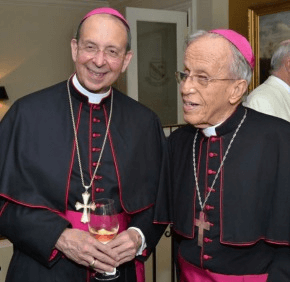By Jim Davis
Catholic News Service
CORAL GABLES, Fla. – For Juan J. Calvo, the dual calling of the Knights of Malta goes “together in the Catholic faith.”
That twofold calling – serving the sick and the poor and defending the faith – came into clear focus during the annual ball held by the order’s Cuban Association.
“I contribute my time and abilities to help the needy,” Castro, the association’s president, told the Florida Catholic, Miami’s achdiocesan newspaper. At the same time, he added, it is important “to defend my faith at a time when some people are questioning my beliefs.”
The White Cross Ball, held in Coral Gables Oct. 8, raised more than $140,000 for feeding and medical projects in Latin America and the Caribbean. The evening included the presentation of the group’s Tuitio Fideo award to Baltimore Archbishop William E. Lori for his leadership on defending religious freedom.
The black-tie affair drew not only Cuban-Americans but Cuban churchmen, including retired Auxiliary Bishop Alfredo Petit and Father Juan Carlos Fuentes Fiallo, both of Havana.
“The Knights of Malta have had a huge impact on the parishes, with its projects for those in need,” Father Fiallo said of the 62 church-based soup kitchens and dining rooms in Cuba. “Not only in material aid but the totality of the person. The church presents values and truths that promote the whole man.”
The Tuito Fidei award, in its 11th year, recognizes those whose public actions witness the principles of the faith. Past recipients include Cardinal Sean P. O’Malley of Boston; Thomas Monaghan, founder of Ave Maria University; and Honduran Cardinal Oscar Rodriguez Maradiaga of Tegucigalpa, president of Caritas International.
This year’s honoree, Archbishop Lori, is chairman of the U.S. bishops’ Ad Hoc Committee for Religious Liberty.
After an invocation by Archbishop Thomas G. Wenski of Miami – a Tuitio Fidei awardee in 2010 – Archbishop Lori paid homage to his listeners – the exiles or children of exiles from Cuba.
“You and your families know firsthand what it means to lose your civil liberties,” said Archbishop Lori, who also is chaplain of the federal association of the Knights of Malta. “You know the damage it does to families and society when a government undermines religious freedom.”
He recounted the event that propelled him into the religious freedom battle: a 2009 bill in Connecticut that would have given laypeople financial control of their parishes. The bill would have deprived not only the bishop, but every pastor, from running his own parish, he said.
The bill failed after a public outcry, “but it was a real wake-up call for me,” Archbishop Lori said. “I realized that our religious freedom really was under attack.”
He wrote a pastoral letter on the topic and learned that other bishops were complaining of similar encroachments. That led to formation of the ad hoc committee.
But he urged his listeners to resist politicizing religious freedom. “It should not be a partisan struggle. Rather, it is a profoundly human issue. Freedom is a beautiful gift, but it is also fragile.”
The evening included attendees calling out pledges for donations to the Knights’ charity, Cuchara de Amor. Emcee Al Salas added later that a separate online appeal netted $6,000 to 7,000 for victims of Hurricane Matthew in eastern Cuba.
Cuchara de Amor, which means “Spoon of Love” – for the big wooden spoons that many cooks use in Cuba – was founded four years ago by Aurora and Jose Garrido.
“We wanted to find a way to get people to donate to the soup kitchens – how to make it real?” said Jose Garrido. His solution: asking people to sacrifice five weekends on the town, at $200 each, for a total of $1,000 to feed 20 elderly people for nearly a year in Cuba.
Another way to make it real is the thank-you gift for donors: a wooden spoon wrapped in burlap.
Each year, the Cuban Association provides more than 700,000 meals to 13,000 elderly people on the island. But that’s just one of its many projects around the Caribbean basin.
In the Dominican Republic, teams of doctors, nurses, physician assistants and other volunteers go on three-day medical missions, with specialists in fields like cardiology, oncology, pediatric neurology, gynecology, even dentistry. Each pays his or her own way, at $700 each.
The Knights also send donations to Honduras and Nicaragua. And early this year, they began rotating medical teams at a new clinic for indigenous peoples in Colombia.
Nor are the poor in Miami forgotten: The Cuban Association supports the St. John Bosco Clinic at Corpus Christi Parish and the Food Bank and Health Program at St. John Bosco Parish in Little Havana.
The association’s reach extends across the Atlantic as well, through a biennial mission to Lourdes, France. The Miamians join fellow Knights and feed patients at hospitals, then bring them – in wheelchairs, if necessary – to the baths at the spring where Mary appeared to the young Bernadette in 1858.
All of this and more runs on a tiny budget of $1 million a year, largely because of a lack of bureaucracy. Rather than hire people to do the work, the Knights literally take matters into their own hands.
“This is not a charity where you just give, and the money goes through a central administration,” said Emilio Alonso Mendoza, a lawyer who takes part in the Santiago missions. “It’s a hands-on charity, where you participate. It’s a wonderful charism of helping.”
Also see:
Q&A with Archbishop Lori on religious liberty
Secret Service: Order of Malta quietly casts a long, spiritual shadow
Copyright ©2016 Catholic News Service/U.S. Conference of Catholic Bishops.


